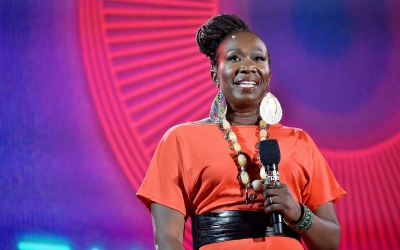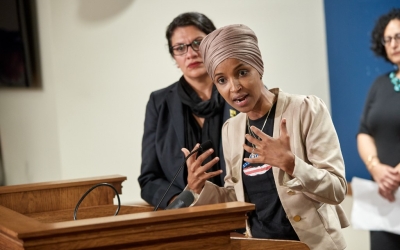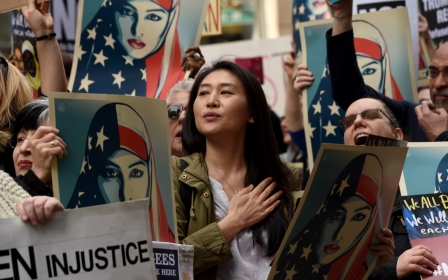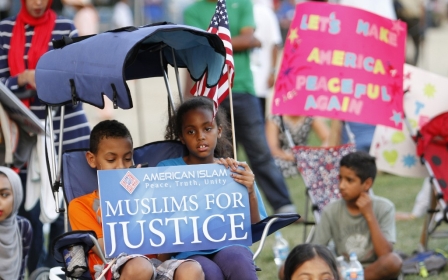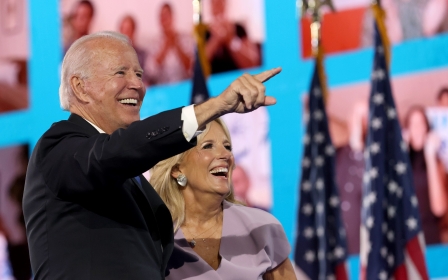Joy Reid addresses anti-Muslim bias in media, but offers no apology
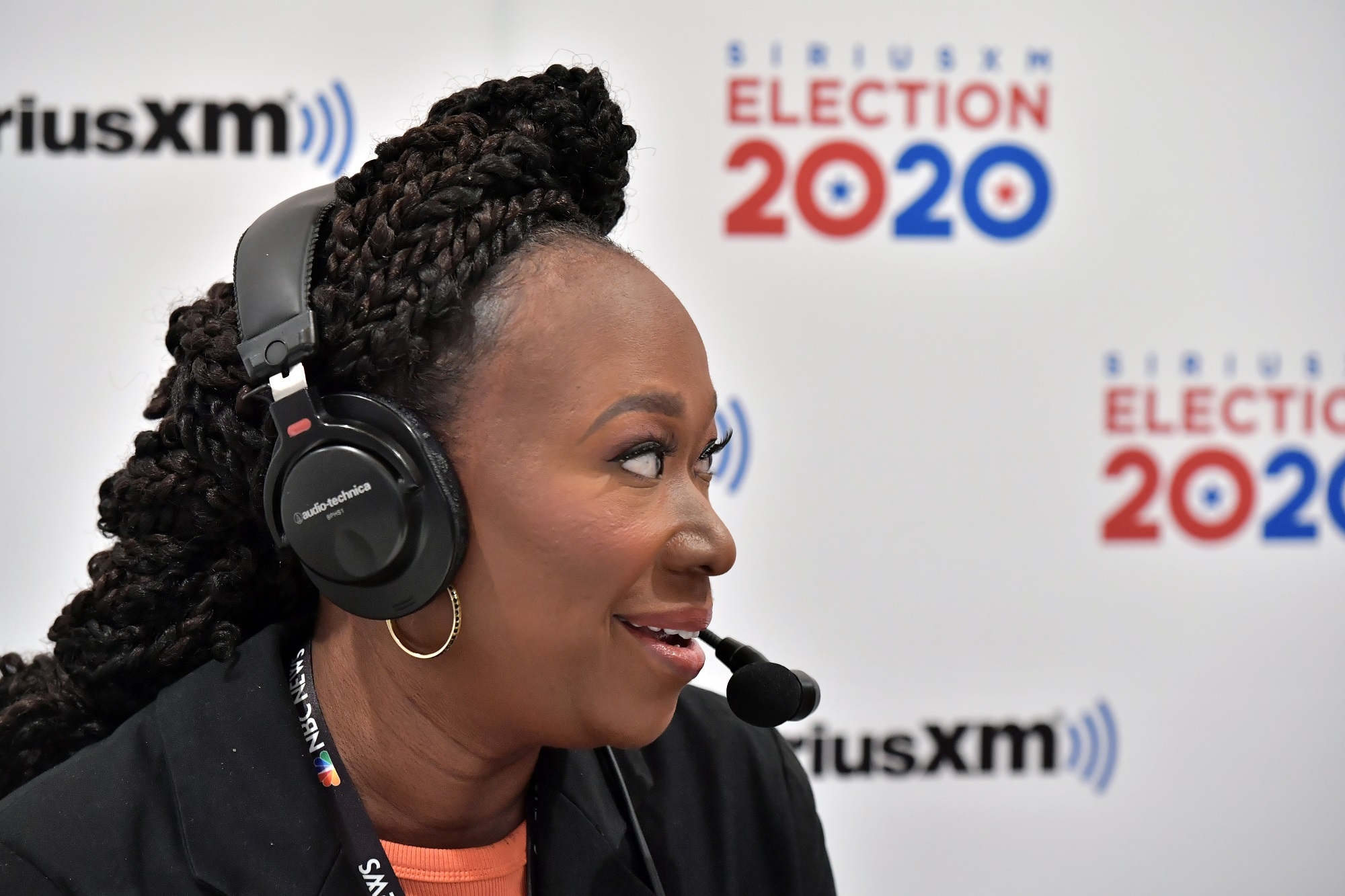
Muslim-American advocates voiced disappointment at MSNBC host Joy Reid's failure to apologise for "Islamophobic" remarks she made earlier this week, when comparing President Donald Trump's rhetoric with how "Muslims act".
After an outcry from Muslim groups, Reid produced a segment on Wednesday evening about anti-Muslim sentiment in which she acknowledged that she "certainly should have been sensitive" to the prevailing bigotry against the Muslim-American community.
"In short, Joy Reid owned up to that a mistake was made but didn't apologise for it," said Robert McCaw, government affairs director at the Council on American Islamic Relations (CAIR).
'It's feeding into the framework of the media vilifying Arabs and Muslims and framing our community in such a negative way'
- Jinan Shbat, ADC
On her nightly show, The ReidOut, the MSNBC journalist hosted Dalia Mogahed, director of research at the Institute for Social Policy and Understanding (ISPU), to discuss the fallout from her remarks.
"The way that I heard your statement, it was intended to make the analogy, which is a fair one, between radicalisation of Muslim extremists, and the radicalisation of young white men in this country," Mogahed said.
New MEE newsletter: Jerusalem Dispatch
Sign up to get the latest insights and analysis on Israel-Palestine, alongside Turkey Unpacked and other MEE newsletters
"The way that it landed and the way that it was heard by some people - many people in fact - was unintentionally saying that Muslims are inherently violent, or that Muslim society and the way Muslims act is violent.
"And though that was not your intention, it is important to correct that notion for your millions of viewers, and that's why I think it's so important to have this conversation."
'Vilifying' Muslims
On Wednesday, Reid, who is a liberal commentator, had brought up Muslims when denouncing Trump, after accusing him of encouraging acts of violence by his supporters amid racial tensions across the country.
"When leaders, let's say in the Muslim world, talk a lot of violent talk and encourage their supporters to be willing to commit violence, including on their own bodies, in order to win against whoever they decide is the enemy, we - in the US - media describe that as: They are radicalising those people - particularly when they're radicalising young people," Reid said.
"That's how we talk about the way Muslims act. When you see what Donald Trump is doing, is that any different from what we describe as radicalising people?"
While Mogahed was in agreement with Reid that the analogy was a fair but badly worded one, other activists and groups objected to invoking Muslims when addressing American dynamics, the likes of which do not exist in the Muslim world.
"We are familiar with 'radicalization' narratives of the world in a cultural war with Arabs and Muslims cast as the existential other," the Arab American Institute (AAI) said in a series of tweets on Wednesday.
The Washington-based advocacy organisation accused Reid of resorting to "anti-Muslim tropes that fuel anti-Muslim bigotry" in order to make a point.
Jinan Shbat, national organiser at the American-Arab Anti-Discrimination Committee (ADC), said it doesn't matter what Reid meant by the analogy, the comparison itself was problematic.
"It's feeding into the framework of the media vilifying Arabs and Muslims and framing our community in such a negative way," she said.
'Disappointing'
McCaw, of CAIR, welcomed Reid's decision to address the controversy by having Muslim voices talk about media bias. "But it would be better if Reid had apologised herself," he told MEE, renewing the call for her to look into the camera and apologise on her next show.
CAIR had described Reid's failure to say sorry as "telling and disappointing".
In opening the segment, Reid decried Islamophobia in the media, saying that Muslim Americans have been the victims of profiling and discrimination.
"For decades, America's Muslim community has endured blanket portrayals that focus on only one thing - not their families or individual achievements or even anything about Islam, nope, just one thing - terrorism," she said.
"Muslims have for two decades now been pressed to answer for every act of terrorism committed by anyone, anywhere in the world who claims to be a Muslim. They're constantly asked: 'Are you going to condemn terrorism? Are you? Are you?' And unfortunately, that has too often also been true of the media," Reid added.
As for her own controversy, Reid said she was trying to expose the hypocrisy by asking how people would react if Trump were a Muslim. "The way that I framed it, obviously did not work," she said.
Trump had seized on the episode to call for Reid's firing. "The very untalented Joy Reid should be fired for this horrible use of the words 'Muslim Terrorists,'" the US president tweeted on Wednesday. "Such xenophobia and racism on MSDNC. Anyone else would be gone, and fast!!!"
Several advocacy groups, including Muslim Advocates and AAI, had called on Reid to apologise. CAIR had revealed on Wednesday that the group was in contact with NBC, MSNBC's parent company, which has pledged to combat Islamophobia.
Shbat slammed Reid over her failure to issue an apology, saying that the controversy was a sign of anti-Muslim bigotry in the mainstream left.
"They can't show too much sympathy towards the Muslim or Arab community," Shbat told MEE.
"There's a wave of liberals who try to defend us when they're fighting someone on the right-wing - when they're talking about Fox News or when talking about the president - but then they won't hold themselves to the same standard."
Middle East Eye delivers independent and unrivalled coverage and analysis of the Middle East, North Africa and beyond. To learn more about republishing this content and the associated fees, please fill out this form. More about MEE can be found here.


